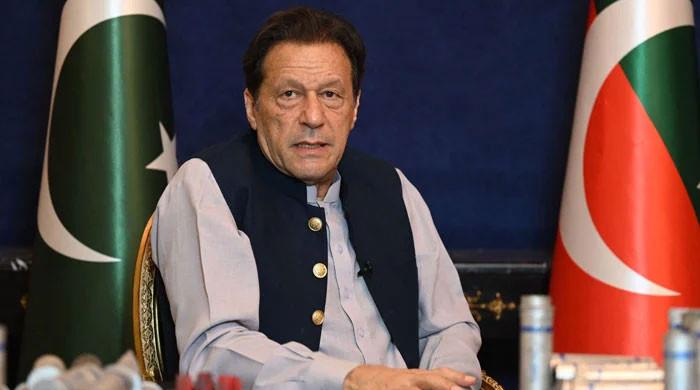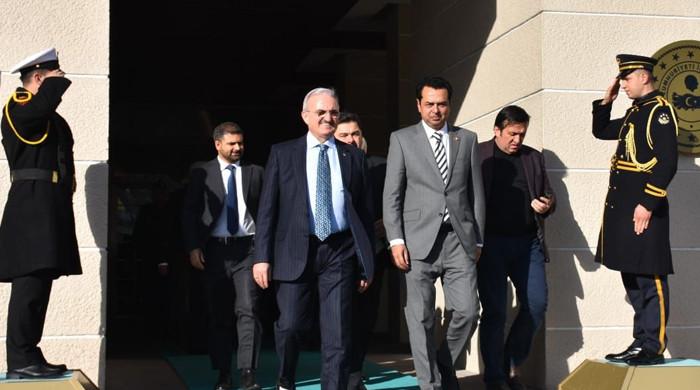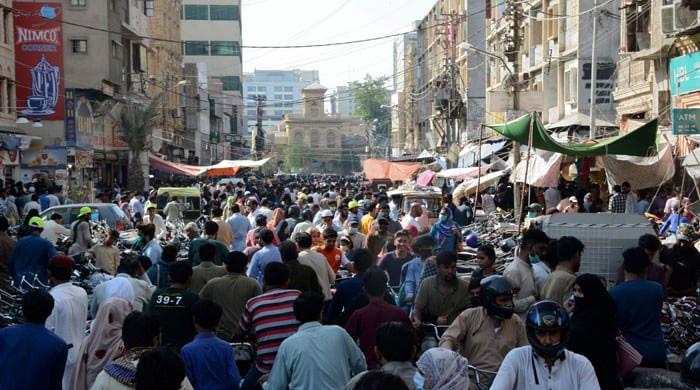Al-Qadir Trust case: Investigators believe Imran Khan, Bushra Bibi in deep trouble
The funds being questioned in case were illicitly transferred to UK disguised as a private housing scheme
May 15, 2023

- British govt's National Crime Agency swiftly froze funds in question.
- UK uncovered £140 million funds in account owned by an individual.
- Former SAPM Shahzad Akbar acted as broker for Khan in matter.
ISLAMABAD: Trouble for Pakistan Tehreek-e-Insaf (PTI) Chairman Imran Khan and his wife Bushra Bibi persists, as they remain at the centre of the graft investigation in the Al-Qadir Trust case.
Last week, however, courts provided "blanket relief" to PTI chief following his arrest by the National Accountability Bureau (NAB) in the case with both the Supreme Court declaring his custody by the anti-corruption body "illegal".
The sources close to the probe, when speaking with The News, said the British government had uncovered a whopping £140 million in an account owned by an individual, who is a renowned Pakistani real estate tycoon's son, and his wife from 2018 to 2019.
Meanwhile, the United Kingdom's National Crime Agency (NCA) swiftly froze the funds, suspecting criminal origins of the proceeds.
Surprisingly, neither the individual nor his wife challenged the account freeze. Following proper legal procedures, the UK then decided to return the laundered funds to Pakistan's government in 2019. This decision was announced through a joint press release issued by the Assets Recovery Unit (ARU) and the NCA.
The case subsequently made its way to Pakistan’s federal cabinet on December 3, 2019, where it was presented by then special assistant to the prime minister (SAPM), Mirza Shahzad Akbar, in a sealed envelope.
The purpose of the presentation was to discuss the return of the funds, which would be channelled into an account overseen by the registrar of Supreme Court of Pakistan.
This particular account was associated with the recovery of a staggering Rs460 billion from the same property tycoon, in connection with fines imposed on a housing scheme in Karachi.
“Khan approved the settlement without allowing his cabinet members to read it,” a source familiar with the investigation told The News.
Investigations have revealed that as part of an agreement to return the laundered money, the property tycoon offered a substantial compensation package. This included the transfer of 458 Kanal, 4 Marla and 58 square feet of land in Jhelum, alongside cash amounting to Rs285 million, which was destined for Al-Qadir Trust.
The trustees of Al-Qadir Trust included then prime minister Khan, his wife Bushra Bibi and his senior advisors Zulfiqar Bukhari and Babar Awan. However, it is worth noting that Awan and Bukhari's positions were subsequently revoked on April 22, 2020.
In light of these events, NAB took immediate action by acquiring all relevant documents and commencing an investigation in compliance with the law.
In June 2022, Prime Minister Shehbaz Sharif’s government established a committee to investigate allegations surrounding the former premier and his wife. The committee was tasked with probing their alleged involvement in securing billions of rupees from the property tycoon to legitimise a laundered amount of Rs140 million, which was subsequently identified and repatriated to Pakistan by the UK.
The £140 million funds in question were illicitly transferred to the UK under the guise of a private housing scheme. The NCA managed to trace and seize the funds, invoking the provisions of the UK’s Economic Crimes Act, which mandates the return of such unlawfully obtained amounts to their rightful country of origin, Pakistan.
A particularly intriguing aspect of the case is the occurrence of an out-of-court settlement that transpired amidst ongoing legal proceedings. As a result of this settlement, the diverted funds originally intended for the Pakistani government were instead bestowed upon the very individual who had incurred the fine.
The circumstances surrounding the representation of Pakistan in the settlement also remain mysterious. The law explicitly designates only the attorney general for Pakistan or the law ministry as authorised signatories for international agreements and contracts. Curiously, no documents in the possession of either the attorney general or the law ministry indicate that any individual had been granted the authority to travel to England and negotiate the settlement.
Further, investigators believe that former SAPM Akbar acted as a broker for Khan and secured £5 million in commission for his role in the settlement.











